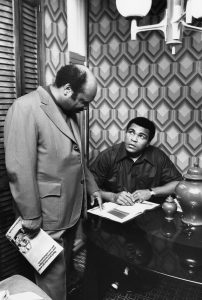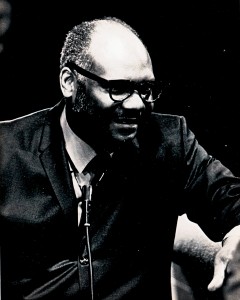June – a month often filled with graduations, weddings and the shimmering sunshine of the first days of summer.
Now June will also be known as the month that we lost an American giant. The self-proclaimed and actual “greatest” heavyweight boxing champion, Muhammad Ali, died on Friday, June 3rd after years of battling the debilitating affects of Parkinson’s disease.
To honor Ali, below is an excerpt from my book regarding the connection between Ali and writer Richard Durham. Back in 1970, these two African American Chicagoans began working on Ali’s autobiography, The Greatest: My Own Story. This book was published in 1975 with Durham serving the book’s credited ghostwriter.
The following excerpt is from Chapter 11 in my book, Word Warrior.

Richard Durham relished the idea of chronicling the life of a man who had mastered his favorite sport, and who had become an internationally known, if controversial, cultural icon. Muhammad Ali and his manager Herbert Muhammad chose Durham as the book’s credited ghostwriter because “Dick was somebody they felt they could have some trust in,” Clarice Durham said. “They wanted a writer who was going to portray Muhammad in [the] positive light he deserved, so they asked Dick if he would do it.”
During his seven years as editor for Muhammad Speaks (the Nation of Islam’s weekly national newspaper), Durham had interacted often with Ali and genuinely liked him. And because of his background as a former amateur boxer, Durham told a reporter years later: “I remember what the training was like [for boxing], what getting hit was like and getting up off the floor after you’ve been hit, to hit back and win.”
Winning.
Ali seemed to do that best, both as a young amateur and as a professional. Born Cassius Marcellus Clay Jr. on January 17, 1942, Clay boxed his way to local stardom in his segregated Louisville, Kentucky, hometown by the end of the 1950s. He earned a spot on America’s 1960 Olympic team and headed to the Summer Games in Rome. With his charming, high-octane personality, Clay emerged as one of the most popular athletes in the Olympic Village. Later, the eighteen-year-old boxer returned home with a gold medal dangling from his neck.
Sportswriter Dick Schaap described a post-Olympics Cassius Clay as “an imposing sight,” with his “developing light-heavyweight build” supporting “180 pounds spread like silk over a 6 foot 2 frame.” A flat-topped, bushy Afro framed Clay’s handsome, light brown face, and he’d shout to whomever would listen:
I’m the World’s Prettiest Fighter!
I’m the World’s Strongest Fighter!
I’m the World’s Fastest Fighter!
Clay also crowned himself “The Greatest” boxer in the world and set out to prove his loud and proud claims…Clay had joined boxing’s professional ranks in fall 1960. During the next three years he scored fifteen knockouts, four decision wins, and no losses. He glided around the boxing ring, light on the balls of his feet—a graceful if lethal dancer. Clay became known as much for his fancy footwork and quicksilver punching skills as for his verbal hijinks. He offered poetic predictions about the specific round his opponents would fall, even if those rhyming projections caused some people to call Clay a braggart or a conman.
Durham saw through Clay’s outsized boasts. “It’s impossible for a person to really conceal himself from another person who’s attentive,” Durham told a reporter.
“You don’t have to be a psychiatrist. If you like the person . . . you become very
sensitive to him and see all the dips and dives. He doesn’t really put on a con job,
by the way. That’s just one part of him. All of us perform somewhat when there
are others around,” Durham said, adding, “Ali just performs more. He does just
about everything more!”
Richard Durham believed that Ali wanted “to go down [in history] with a reputation of never refusing anybody a fight. That’s why,” Durham said, Ali became “the first fighter to really go around the world,” trading punches and combinations with champions from countries like Great Britain, Germany, and Canada.
Ali beat them all, along with his American opponents.
In Durham’s eyes, Ali used his grace and bruising power, his prefight antics and his rhyming predictions to establish his global boxing dominance.
Ali eventually became a three-time heavyweight boxing champion. But he also was a man who refused, on moral and religious grounds, to fight in the Vietnam War. As a result, Ali had to tackle the serious legal and financial consequences of his actions.
Read more about this fact and the Ali/Durham collaboration in Word Warrior and be inspired.


